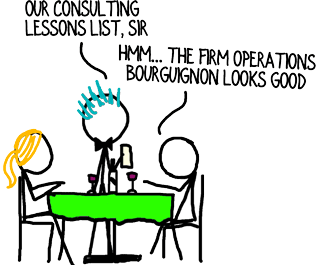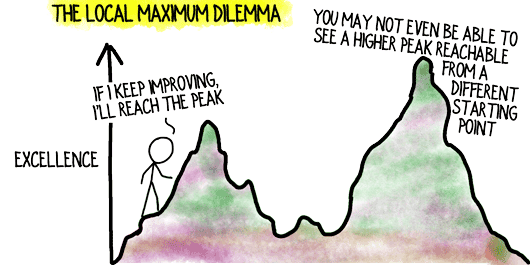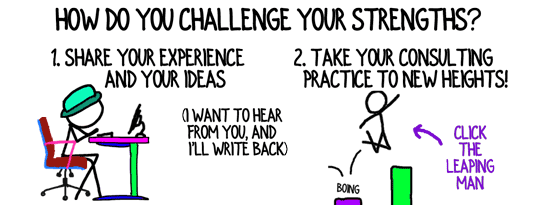Le Cirque, a beacon of fine dining in the 1980s and 1990s, declared bankruptcy in 2017. You can’t enjoy their Michelin-star sauces anymore, but you can sop up an important lesson about running your consulting firm.

You most likely live by the maxim of building on your strengths. Perfecting your consulting firm’s signature dish will attract more customers and produce higher satisfaction than addressing your mediocre house salad.
Improving on your strengths is important, of course. Your consulting firm becomes more efficient, hires better staff and delivers greater value for your clients when you fine tune your offerings, processes and methods.
Your consulting firm becomes the best version of itself.
Unfortunately, the best version of your firm may not stack up well against a different, more effective approach developed by another consulting firm.
The Local Maximum Dilemma
The process of optimizing can anchor you to a “local maximum” that blinds your firm to better, but radically different, paths to creating value for your clients.
The math-minded among us would point out that you reach a local maximum when you constantly improve on your current position. For consulting firms, that applies to your capabilities, messaging, approaches, and offerings.*

Le Cirque’s downfall epitomizes the predicament—while they perfected French cuisine, high-end dining progressed to molecular gastronomy then to immersive dining, rendering Le Cirque passé.
Your local maximum challenge is akin to the famous Innovator’s Dilemma, in which a company outright rejects any approach that threatens an offering they’ve invested into heavily.
To be clear, as long as you’re helping clients, there’s nothing inherently wrong with having good-but-not-best solutions and methodologies.
However, if you’re truly devoted to long-term success based on delivering the best value for your clients in the most efficient manner, you need to be willing to adopt new, better approaches.
The Annual, Paradigm Shift Challenge
Once each year, hold a Wild Ideas Brainstorming Session that generates radically different approaches to each element of your consulting business: how you win projects, how you solve client challenges, how you deliver your work and how you operate as a firm.
One person in your firm (or an outside advisor) should be assigned to scouring the marketplace for alternative solutions—even crazy ones—touted or employed by other consulting firms.
As tempting as it will be to poke holes in those wild ideas, your mission during the challenge is the opposite: Determine how a consulting firm could make the unconventional concepts produce better results in any circumstances compared to your current approaches.
Create a rapid-feedback plan to test any intriguing opportunities; the consulting equivalent of an experimental menu where your most trusted patrons sample your avant-garde dishes and provide candid feedback
What step(s) do you take to explore approaches that may feel challenging, confronting and even heretical to your current beliefs?
Text and images are © 2024 David A. Fields, all rights reserved.

 David A. Fields Consulting Group
David A. Fields Consulting Group 

Thanks David, I always enjoy your weekly articles. I embrace AI as a useful tool and seem to constantly champion it to my colleagues who are way of it. I do have one
caveat though, “AI is quite useful, but don’t put it in charge.’
AI can certainly provide great prompts for challenging your current thinking, Elaine. Totally agree. And, of course, your rule of not putting AI in charge is right on the mark.
Thanks for sharing your ideas!
As a solopreneur I’ve found 2 actions have helped me not get stuck in the same rut, errr, practices. First, I’ve become involved in several online communities with members from all around the world who bring very different views, ideas, and insights that make me reflect and reconsider my own beliefs. The other is, after the reflections from prior step, I go learn more about the tool, platform, practice, or processes and see where they might align with my client’s needs in new ways and how I might add them effectively. Glad to share the groups to anyone interested (focus is on L&D) and always open for virtual coffees!
Hi William,
I’d love to hear about the groups you’ve joined and have found value in.
Thanks,
Christin
Christin, depending on the size of your firm and your focus area, there are few different places you could look. Please email my team (support@davidafields.com) and we can give you better direction. Of course, email Bill too!
Outstanding, Bill. Meeting with peers–particularly peers with diverse backgrounds and viewpoints, is enormously helpful for challenging your paradigms.
You’re an excellent example of a consultant willing to try on uncomfortable approaches. Well done, Bill!
This story reminded me of the movie Blackberry I just watched (fictional based on real events). And I was a HUGE Blackberry fan. I vividly remember checking my Blackberry shortly after giving birth- ha! The scene that shows the entire team watching Steve Jobs announce the iPhone was fascinating. It was difficult for the founder to see any other perspective after they “invented” the product space. In my own agency, I try to form strong strategic partnerships that can help us deliver new offerings and see new perspectives. And I love learning through your articles David!
Blackberry is a perfect example. Perhaps even better than Le Cirque… but less tasty. Seeing an alternative perspective is beyond difficult–you’re programmed not to see it because it’s threatening. Good on you for leaning on partnerships (and on these articles), Jill!
I’m glad you mentioned Blackberry, Jill. That helps bring the concept even more to life for other readers.